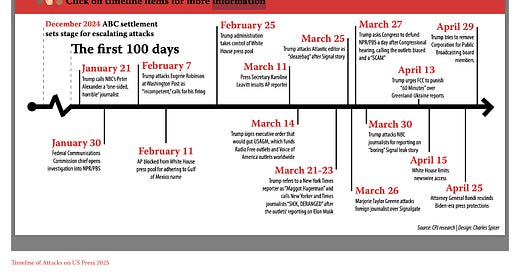Public media on the ropes: US House cuts public media funding
Senate to reconcile the budget bill; NPR sues White House
The U.S. House of Representatives passed a budget bill that defunds public media—along with many other public programs—with a one-vote majority on Sunday, May 18.
The threatened claw-back of current public media funding is also on the table, even though some insiders had believed that DOGE didn’t have the votes for a rescission in Congress.
On Tuesday, NPR and Colorado public media sued the White House for retaliation. It’s possible that if NPR secures a judicial injunction, the lawsuit may prevent funding cuts while the rest of the case makes its way through the courts and with one of the nation’s best First Amendment attorneys at the helm.
PBS is not a party to the retaliation lawsuit, at least not yet. The Corporation for Public Broadcasting (CPB) filed suit earlier after the president claimed he could fire three of the five members of the CPB board. The CPB is not a federal executive agency.
The Committee to Protect Journalists recently drew attention to the scale and scope of the current administration’s attacks on the press with this illustrated timeline, which feels a little out of date this week with the advancement of the budget bill.
The budget bill is known as the One Big, Beautiful Bill Act, or OBBBA. It contains legislative changes that could threaten non-profits as well as significant cuts to other federal programs. Many policymakers are still trying to understand and communicate what’s in the massive bill, which is reportedly 1,000 pages long.
The Senate had previously approved the budget framework. Therefore, according to this story in The Hill, the House leadership says they don’t expect big changes as the bill is reconciled, although a handful of Senators have already called for changes.
As it became increasingly clear that the GOP may be successful with its long-term goal to stop funding the CPB, Protect My Public Media, a project of the largest public media outlets, updated their campaign with a tool to assist in reaching your representatives. And groups such as the National Federation of Community Broadcasters are urging community outlets to prepare for more punishing tactics from the executive branch, including an attempt to block a transfer of funds from the U.S. Treasury to the CPB in October.
In addition, more groups are recognizing the need to build the social capital of small and medium-sized media outlets, including public media. For example, The Media and Democracy Project has built a directory to help people find (and support) local journalism outlets near them. (Submit outlet additions, suggestions and corrections to the directory at info@mediaanddemocracyproject.org.)
And, the project’s online event and meet-up schedule for more social-capital building is here.
“Social capital”?
Fans of Robert Putnam’s book, Bowling Alone, know that as Americans became more educated, and yet less involved in civic life, our social capital—the social networks that supported progress in human rights and the human condition for much of the 20th century—has declined. Perhaps this is what the Chief Justice was alluding to when he complained about the decline in civics education.
Committing to basic communication is also part of supporting social capital. So, it’s easy to understand why community leaders in Los Angeles, recently ravaged by wildfires, would be distressed that the Federal Communications Commission agreed to delay the multi-lingual requirement for emergency communications.
This FCC Actions Alert is produced by the volunteers at the Community Media Assistance Project under the direction of CMAP Executive Director, Betty McArdle. We monitor many sources of information about the Federal Communications Commission, federal communications law, and community developments important to your station and your community. The information provided in this newsletter is for general informational purposes only and should not be considered as financial or legal advice. Always consult with a qualified professional before making any decisions based on the content herein. If you have a news tip, please email us at betty@c-map.org.
Communications Act of 1934, Sect. 326.
Nothing in this Act shall be understood or construed to give the Commission the power of censorship over the radio communications or signals transmitted by any radio station, and no regulation or condition shall be promulgated or fixed by the Commission which shall interfere with the right of free speech by means of radio communication.




